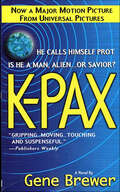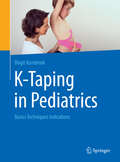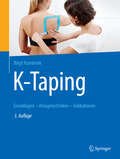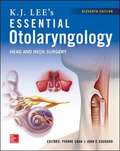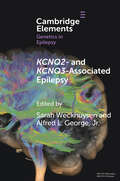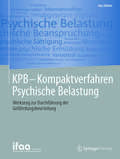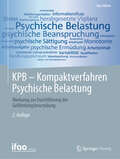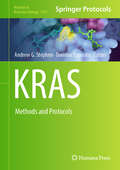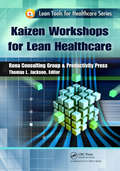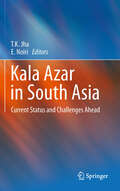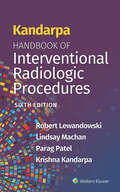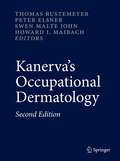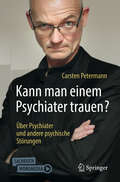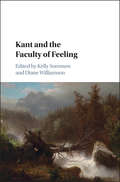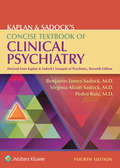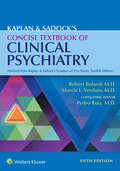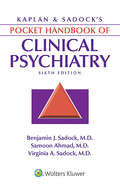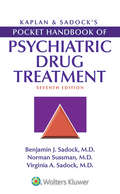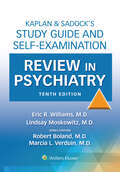- Table View
- List View
K-Pax: A Novel (K-pax Ser. #1)
by Gene BrewerA psychiatric patient makes a compelling case for his extraterrestrial home in this “gripping . . . touching and suspenseful” novel—now a major motion picture (Publishers Weekly).Psychiatrist Gene Brewer doesn’t have a diagnosis for the mysterious new patient who calls himself “prot” (rhymes with goat). But this strange and likeable man cannot be—as he claims—from the planet K-PAX.Or can he? Prot knows facts about space that confound experts. He soon reveals Dr. Brewer’s own deepest pains and most sublime longings. And his tales of K-PAX have other patients competing to go along with him when he heads “home”.Now the doctor is racing the clock to find prot’s true identity before he loses a man whose “madness” might just save them all . . .
K-Taping bei Kindern: Grundlagen - Techniken - Indikationen
by Birgit KumbrinkDieses Praxisbuch liefert Physiotherapeuten, Pädiatern, Ergotherapeuten und Logopäden die wichtigsten Anlagetechniken bei Kleinkindern, Kindern und Jugendlichen.Aus dem Inhalt:• Kontraindikationen, Farblehre und Kombinationstherapien• Anlagetechniken für Muskulatur, Ligamente und Lymphsystem• Funktionsweise von K-Taping und Grundregeln für die Behandlung von Kindern• Indikationsspezifische Tape-Anlagen, z. B. bei Haltungsschäden, Plexusparese, Fußdeformitäten oder LungenerkrankungenOptimieren Sie Ihre Behandlungsergebnisse und verhelfen Sie Ihren kleinen und größeren Patienten zu mehr Lebensqualität.In der 2. Auflage komplett überarbeitet und aktualisiert.
K-Taping in Pediatrics
by Birgit KumbrinkAlready integrated successfully in competitive sports, medical treatment and rehabilitation programs, K-Taping therapy offers physical, occupational and speech therapists a wide range of options for the treatment of infants, small children and younger patients. K-Taping can now be integrated into pediatric physiotherapy and speech therapy, aiding in the treatment of a range of conditions including postural defects, deformities of the feet and dysphagia. About the content K-Taping in theory - The properties, function and mode of action of elastic K-Tape - The effects of K-Tape therapy - The fundamentals of K-Tape application - Contraindications K-Taping in practice - The four major application techniques (muscle, ligament, correction and lymph applications) including common indications in children, and practical examples - The appropriate technique for more than 50 medical indications - Step by step guidance with photo series, practical tips and alternative applications About the author Birgit Kumbrink, founder and medical director of the international K-Taping Academy, Dortmund, Germany and one of the most experienced users and teachers of the treatment method internationally. The course companion and practical manual - for therapists, midwives and pediatricians
K-Taping: Grundlagen - Anlagetechniken - Indikationen
by Birgit KumbrinkK-Taping wird im Leistungssport, der Prävention, der Trainingstherapie sowie der Rehabilitation genauso erfolgreich angewandt wie in medizinischen Behandlungs- und Nachsorgekonzepten, z.B. in der Orthopädie, Chirurgie, Neurologie, Gynäkologie, Onkologie, Geriatrie, Pädiatrie. 40.000 Physiotherapeuten, Ergotherapeuten, Trainer, Ärzte und Heilpraktiker arbeiten bereits damit: Dieses Praxisbuch – bereits in acht Sprachen übersetzt - informiert umfassend über die etablierte K-Taping-Methode und zeigt Ihnen, wann und wie Sie diese Methode professionell einsetzen. Neu in der 3. Auflage: Hautreaktionen durch falsche Tapeanlage vermeiden und 10 weitere Indikationen für CROSSTAPE Kursbegleiter und Praxisbuch – ein Muss für alle, die eine K-Taping-Ausbildung absolvieren oder bereits abgeschlossen haben!
K. J. Lee's Essential Otolaryngology: Head and Neck Surgery
by K. J. Lee Yvonne Chan John G. GoddardThe leading guide in otolaryngology - invaluable for board review or as a clinical refresher For more than four decades,K. J. Lee''s Essential Otolaryngology: Head and Neck Surgery has been the premier national and international guide to otolaryngology. The eleventh edition of this classic reference has been thoroughly updated to bring you up to speed with today''s practice of otolaryngology. This concise, easy-to-follow book presents the latest clinical information to help you treat the wide range of conditions involving the head and neck or prep for board review. It is organized to allow for quick clinical recall and high yield review of the field''s must-know information.
KCNQ2- and KCNQ3-Associated Epilepsy (Elements in Genetics in Epilepsy)
by Sarah Weckhuysen Alfred L. George Jr.KCNQ2 and KCNQ3 encode subunits (KV7.2, KV7.3) that combine to form a voltage-gated potassium ion (K+) channel responsible for generating an ionic current (M-current) important for controlling activity in the nervous system. Pathogenic variants in both genes are associated with a spectrum of genetic neurological disorders that feature epilepsy of variable severity and can be accompanied by debilitating impaired neurodevelopment. These two genes were among the first discovered causes of monogenic epilepsy, and are frequently identified in persons with early-life epilepsy. This Element provides a comprehensive review of the clinical features, genetic basis, pathophysiology, pharmacology and treatment of these prototypical neurological disorders accompanied by perspectives shared by affected families and scientists who have made seminal contributions to the field. This title is also available as Open Access on Cambridge Core.
KI in der Psychologie - ist der Mensch eine Maschine? (essentials)
by Peter Gloor Marc SchreiberIm Buch wird die Frage diskutiert, ob der Mensch eine Maschine ist und ob Algorithmen der künstlichen Intelligenz (KI) das menschliche Erleben und Handeln jemals komplett abbilden können werden. Die Fragen werden sowohl aus der Perspektive der Psychologie als auch aus derjenigen der Informatik beleuchtet. Anhand von konkreten Projekten werden die Gemeinsamkeiten und Unterschiede der beiden Perspektiven erläutert und es werden Probleme sowie ethische Fragestellungen im Zusammenhang mit der Anwendung von KI-Algorithmen in psychologischen Anwendungsfeldern thematisiert.
KPB - Kompaktverfahren Psychische Belastung
by Institut für angewandte ArbeitswissenschSeit der Novellierung des Arbeitsschutzgesetzes ist die psychische Belastung im Rahmen der Gefährdungsbeurteilung explizit zu berücksichtigen. Die zunehmende Bedeutung der psychischen Gesundheit in der Arbeitswelt verdeutlicht, dass psychische Faktoren im Rahmen der Prävention wichtig sind. Das Kompaktverfahren Psychische Belastung gibt einen Überblick über die rechtlichen Grundlagen und beschreibt eine gestufte Vorgehensweise zur Ermittlung und Bewertung psychischer Belastung bei der Arbeit. Die praktische Arbeit wird mit einfachen Checklisten und Verfahrenshinweisen für die Beurteilung und Dokumentation der Gefährdungsbeurteilung unterstützt. Die vorliegende fünfte überarbeitete Version des in der Praxis bewährten KPB berücksichtigt die Empfehlungen der Gemeinsamen Deutschen Arbeitsschutzstrategie (GDA).
KPB - Kompaktverfahren Psychische Belastung: Werkzeug zur Durchführung der Gefährdungsbeurteilung (ifaa-Edition)
by ifaa – Institut für angewandte Arbeitswissenschaft e.V.Seit der Novellierung des Arbeitsschutzgesetzes ist die psychische Belastung im Rahmen der Gefährdungsbeurteilung explizit zu berücksichtigen. Die zunehmende Bedeutung der psychischen Gesundheit in der Arbeitswelt verdeutlicht, dass psychische Faktoren im Rahmen der Prävention wichtig sind. Das Kompaktverfahren Psychische Belastung gibt einen Überblick über die rechtlichen Grundlagen und beschreibt eine gestufte Vorgehensweise zur Ermittlung und Bewertung psychischer Belastung bei der Arbeit. Die praktische Arbeit wird mit einfachen Checklisten und Verfahrenshinweisen für die Beurteilung und Dokumentation der Gefährdungsbeurteilung unterstützt. Die vorliegende fünfte überarbeitete Version des in der Praxis bewährten KPB berücksichtigt die Empfehlungen der Gemeinsamen Deutschen Arbeitsschutzstrategie (GDA).
KRAS: Methods and Protocols (Methods in Molecular Biology #2797)
by Andrew G. Stephen Dominic EspositoThis volume details protocols ranging from high yield production metabolically labeled KRAS for NMR studies to approaches that quantify engagement of novel molecules that bind KRAS in live cells. Chapters focus on protein production and characterization, biochemical assays, cell-based assays, KRAS-membrane interactions, targeting KRAS, and cell models. Written in the highly successful Methods in Molecular Biology series format, chapters include introductions to their respective topics, lists of the necessary materials and reagents, step-by-step, readily reproducible laboratory protocols, and key tips on troubleshooting and avoiding known pitfalls. Authoritative and cutting-edge, KRAS: Methods and Protocols aims to provide methods that will be instrumental in the development of future clinically approved KRAS therapeutics.
Kaizen Workshops for Lean Healthcare (Lean Tools for Healthcare Series)
by Thomas L. JacksonPart of the Lean Tools for Healthcare series, this user-friendly book will help to improve your understanding of kaizen. It describes exactly what a kaizen event is and details all the phases necessary for implementing continuous improvement practices in your healthcare organization.Kaizen Workshops for Lean Healthcare walks you through the steps of conducting an effective kaizen workshop one that is well planned, well implemented, and well monitored. The information is presented in an easy-to-assimilate format. Numerous illustrations reinforce the text and margin assists call your attention to key terms, healthcare examples, and how-to steps. Throughout the book, you will be asked to reflect on questions that will help you apply the concepts and techniques in your own workplace. Defining the key concepts and elements of the production of healthcare services, the text delineates the differences between healthcare processes and the individual cycles of work that those processes link together. It also:Provides foundational information on kaizen and kaizen workshops defining the key roles for successExplains exactly how to plan and prepare Presents examples of how to present workshop results and how to follow upIncludes a concise summary of kaizen workshop stepsSupplies a list of additional resources for learning more about the different kinds of improvement methodologies you might want to implement in your kaizen workshopsIf your healthcare organization fully applies the steps detailed in this book, it will gain much more than the knowledge of how to conduct a workshop. Through kaizen, you will empower your employees to make positive change a reality. And incrementally, kaizen workshops will
Kala Azar in South Asia
by E. Noiri T. K. JhaTherapeutic regimens for visceral leishmaniasis (also Kala-azar, Dum-dum fever or black fever), caused by parasitic protozoa of the Leishmania genus, evolve at a pace never seen before. Spread by tiny and abundant sand flies, the parasite infects internal organs and bone marrow and if left untreated will almost always result in the death of the host. In developing countries successful diagnosis and treatment are complicated by asymptomatic cases, undernutrition and Kala-azar/HIV co-infections. This book brings together world-renown experts writing state-of-arts review on the progress in diagnosis and treatment of visceral leishmaniasis, ultimately leading to the complete elimination of this fatal disease from South Asia. The chapters provide valuable information for disease control as well as therapy and the diagnostic improvements necessary for early treatment, subclinical detection and drug-resistant cases. The presented methods allow for points-of-care testing in the endemic area, enabling rapid detection in resource-poor settings with easy handling and low costs. This book provides essential information for scientists, medical practitioners and policy makers involved in the diagnosis, treatment and elimination of Kala-azar.
Kala Azar in South Asia
by E. Noiri T. K. JhaVisceral leishmaniasis (VL), (also known as black fever or Kala-azar) is a life-threatening disease first reported from the Indian subcontinent. VL ranks as the world's second largest parasitic disease killer and is a neglected tropical disease. Most of those infected by this life-threatening disease are uneducated daily wagers working to support their families, and vectors easily disseminate the disease to their neighbors. Owing to recent involvement of stakeholders, the number of patients is decreasing, but eradication remains a distant goal. This second edition presents latest reports of visceral Leishmaniasis by specialists working at the forefront of the endemic areas in Indian subcontinent. It also introduces vaccine development and inhibitors to Trypanosomatidae; some of them describing feasibility studies in visceral Leishmaniasis for the first time. Recent progress of the Science and Technology Research Partnership for Sustainable Development (SATREPS) is also reviewed and the contents share this collaborative research from the forefront of endemic sites in Bangladesh. Widely covering basic, clinical, epidemiological and entomological aspects, this volume will be of great interest to dedicated researchers interested inLeishmaniasis and to experts of NTDs in global health. There is a tide in the affairs of men. Which, taken at the flood, leads on to fortu≠ Omitted, all the voyage of disease control is bound in shallows and in miseries. ~modified from Shakespeare ~
Kampo: A Clinical Guide to Theory and Practice, Second Edition
by Dan Bensky Gretchen De Soriano Keisetsu Otsuka Nigel DawesKampo, a traditional Japanese medical system derived from Classical Chinese Medicine and comprising unique diagnostic methods, herbal formulas and therapeutic approaches, is made accessible to English-speaking practitioners through this definitive translation of Dr Keisetsu Otsuka's classic work. This clinical handbook summarizes diagnostic theory and methodology then leads onto a section including 80 principal formulas followed by a therapeutic section organised according to allopathic definitions of disease. It follows a systems approach in internal medicine beginning with respiratory and cardiovascular disorders, moving through a comprehensive analysis of all the body systems. Essential clinical information on how differential diagnosis and formula selection is achieved is outlined within the Kampo tradition. A comprehensive index of 120 major herbal formulas and 180 individual herbal ingredients is included, as is the translators' original Glossary of terms designed to clarify concepts of health and disease unique to Kampo and Japanese culture. The translators have taken care to retain Dr Otsuka's own thoughts and opinions on how to study Kampo, as well as demonstrative case studies from his own files, making this a direct source of his wisdom and teachings. Also including an overview of Kampo in the current age and guidance on integrating it into modern practice, this is an essential resource for anyone practicing or studying in this tradition.
Kandarpa Handbook of Interventional Radiologic Procedures
by Robert Lewandowski Lindsay Machan Parag J. Patel Krishna KandarpaFocusing on time-tested protocols, tailored imaging and current procedural equipment, this popular, practical handbook by Drs. Krishna Kandarpa, Lindsay Machan, Robert Lewandowski, and Parag J. Patel features extensive updates to keep you current with rapid growth in the field. Now in brilliant full color throughout, Kandarpa Handbook of Interventional Radiologic Procedures, 6th Edition, is a convenient, easy-access guide to all current radiologic procedures. It’s an ideal resource not only for practicing interventional and general radiologists, but also for fellows and residents in training, IR nurses, and special procedure technologists.
Kanerva’s Occupational Dermatology
by Howard I. Maibach Peter Elsner Thomas Rustemeyer Swen Malte JohnOccupational skin diseases are a field of increasing interest in today's dermatology. Due to rapid developments in several areas of modern industry, new dermatological problems constantly occur amongst workers. The 1st edition of this Handbook of Occupational Dermatology was published in 2000 and has served as the main reference book of occupational skin diseases for general and occupational dermatologists and occupational physicians. The new edition is completely revised, updated and extended with respect to new developments. The layout allows for both quick access to practical information and in-depth reading. Included are concise tables, algorithms and figures on how to optimize the diagnostic procedure for daily patient management and expert opinion. The new edition will continue the success as major source of reference for clinical and experimental work in the field of occupational skin diseases, both for students and experts.
Kanker en huid: Dermato-oncologie voor de huisarts
by Johan Toonstra Anton C. GrootDoor de toenemende incidentie van huidkanker, multipele tumoren bij patiënten en regelmatige controles neemt het beslag dat dermato-oncologische problematiek op huisartsen legt sterk toe. Het aantal consulten voor patiënten met (vermoeden op) huidkanker stijgt dan ook in rap tempo. Om zo efficiënt mogelijk aan de toegenomen zorgvraag te kunnen voldoen en de patiënten optimale zorg te kunnen bieden, is een gedegen kennis van de presentatievormen van huidkanker,hun prognose, therapieën, controles en preventie noodzakelijk. De onmisbare kennis hiervoor is in dit boek gebundeld en wordt op een praktische manier gepresenteerd en aanschouwelijk gemaakt door een groot aantal klinische afbeeldingen. Niet alleen worden de meest voorkomende vormen van huidkanker beschreven, zoals het basaalcelcarcinoom, plaveiselcelcarcinoom en het melanoom, maar ook de wat minder frequent optredende maligniteiten passeren de revue. Ook wordt ruim aandacht besteed aan de premaligne aandoeningen, waaruit huidkanker kan ontstaan, met de actinische keratose als bekendste en meest voorkomende representant. Daarnaast bevat dit boek hoofdstukken over erfelijke aandoeningen die met een verhoogd risico op huidkanker gepaard gaan (zoals het familiair dysplastisch naevussyndroom) en over huidafwijkingen die kunnen optreden bij kanker in andere organen. Uiteraard ontbreken hoofdstukken over epidemiologie, risicofactoren, preventie en therapie niet. Kanker en Huid is in eerste instantie bedoeld voor huisartsen, huisartsen in opleiding en studenten geneeskunde. Maar ook andere artsen, praktijkondersteuners, nurse practitioners en(al dan niet gespecialiseerde) verpleegkundigen zullen in hun werk regelmatig met huidkanker of voorstadia daarvan worden geconfronteerd, zodat dit boek ook voor hen waardevol zal zijn. Over de auteurs Kanker en huid, dermato-oncologie voor de huisarts is geschreven door dr. Anton C. de Groot(1951) en dr. Johan Toonstra (1949). De Groot heeft van 1980 tot 2002 als dermatoloog gepraktiseerd in het Carolus Ziekenhuis en het Willem Alexander Ziekenhuis in s-Hertogenbosch en was daarnaast actief als hoofdredacteur van het Nederlands Tijdschrift voor Dermatologie en Venereologie. Hij is auteur van 4 boeken en meer dan 350 publicaties. Dr. Johan Toonstra is sinds 1983 als dermatoloog verbonden aan het Meander Medisch Centrum. Sinds 1983 is hij tevens werkzaam als staflid in het UMCU, waar hij de Summa-poli leidt. Toonstra is actief als redacteur van de rubriek Leerzame Ziektegeschiedenissen van het Nederlands Tijdschrift voor Dermatologie en Venereologie, heeft meegewerkt aan een tiental boeken en is (mede)auteur van ongeveer 150 publicaties.
Kann man einem Psychiater trauen?: Über Psychiater und andere psychische Störungen
by Carsten PetermannIn einer Mischung aus Ernst, Satire, schwarzem Humor und Poesie nimmt der Autor, selber Facharzt für Psychiatrie und Psychotherapie, auf ungewöhnliche und kreative Weise den eigenen Berufsstand aufs Korn. In einer unterhaltsam-pointierten und zugleich fachkundigen Art und Weise vermittelt er darüber hinaus, wie nebenbei, Informationen über psychische Störungen, wie die Depression, die bipolare affektive Störung, die Borderline-Persönlichkeit sowie die paranoide Schizophrenie - mit dem Ziel, auf diese einzigartige und empathische Weise Betroffenen und Angehörigen Hilfestellung anzubieten. Audioclips zu ausgewählten Abschnitten sind per MoreMediaApp abrufbar und geben einen Eindruck vom begleitenden Bühnenprogramm. Zielgruppe sind alle Leser, die sich auf unterhaltsame Weise über psychische Erkrankungen informieren möchten und schon immer gerne wissen wollten - kann man einem Psychiater trauen?
Kant and the Faculty of Feeling
by Diane Williamson Kelly SorensenKant stated that there are three mental faculties: cognition, feeling, and desire. The faculty of feeling has received the least scholarly attention, despite its importance in Kant's broader thought, and this volume of new essays is the first to present multiple perspectives on a number of important questions about it. Why does Kant come to believe that feeling must be described as a separate faculty? What is the relationship between feeling and cognition, on the one hand, and desire, on the other? What is the nature of feeling? What do the most discussed Kantian feelings, such as respect and sublimity, tell us about the nature of feeling for Kant? And what about other important feelings that have been overlooked or mischaracterized by commentators, such as enthusiasm and hope? This collaborative and authoritative volume will appeal to Kant scholars, historians of philosophy, and those working on topics in ethics, aesthetics, and emotions.
Kantianism for Animals: A Radical Kantian Animal Ethic (The Palgrave Macmillan Animal Ethics Series)
by Nico Dario MüllerThis open access book revises Kant’s ethical thought in one of its most notorious respects: its exclusion of animals from moral consideration. The book gives readers in animal ethics an accessible introduction to Kant’s views on our duties to others, and his view that we have only ‘indirect’ duties regarding animals. It then investigates how one would have to depart from Kant in order to recognise that animals matter morally for their own sake. Particular attention is paid to Kant’s ‘Formula of Humanity,' the role of autonomy and the moral law, as well as Kant’s notions of practical reason and animal instinct. The result is a deliberately amended version of Kantianism which nevertheless remains faithful to central aspects of Kant’s thought. The book’s final part illustrates the framework’s use in applied contexts, addressing the issues of using animals as mere means, the ethics of veganism and vegetarianism, and environmental protection. Nico Dario Müller shows how, when furnished with duties to animals, Kant's moral philosophy can be a powerful resource for animal ethicists.
Kaplan & Sadock's Concise Textbook of Clinical Psychiatry
by Pedro Ruiz Virginia A. Sadock Benjamin SadockCompact and easy to use, Kaplan & Sadock's Concise Textbook of Clinical Psychiatry, Fourth Edition is an authoritative, affordable text that provides must-know information in clinical psychiatry. Containing the most relevant clinical material from the best-selling Kaplan and Sadock’s Synopsis of Psychiatry, Eleventh Edition, it offers step-by-step guidance on the clinical examination, the psychiatric report, medical assessment of the psychiatric patient, laboratory tests, and signs and symptoms, as well as all psychiatric and substance-related disorders, with special chapters on children, adolescents, and the elderly. It also covers special topics such as emergency psychiatry, forensic psychiatry, ethics, and palliative and end-of-life care.
Kaplan & Sadock's Concise Textbook of Clinical Psychiatry
by Robert Boland Marcia VerduinSuccinct, authoritative, and affordable, Kaplan & Sadock’s Concise Textbook of Psychiatry, 5th Edition, provides must-know information in clinical psychiatry from the names you trust. From cover to cover, it contains the most relevant clinical material from the bestselling Kaplan and Sadock’s Synopsis of Psychiatry, 12th Edition, including the foundational chapters on assessment, the disorder specific chapters, and all of the treatment-specific chapters among other essential topics such as emergency psychiatry, ethics, and palliative/end-of-life care. New editors Robert Boland and Marcia L. Verduin, along with consulting editor Pedro Ruiz, have updated all content with a focus on reformatting and summarizing for faster access to key information.
Kaplan & Sadock's Pocket Handbook of Clinical Psychiatry
by Benjamin J. Sadock Virginia A. SadockCompletely revised to bring you up to date with current DSM-5 classifications, new medications, and more, Kaplan & Sadock’s Pocket Handbook of Clinical Psychiatry, Sixth Edition, is a concise, easy-to-use guide to diagnosing the full range of psychiatric disorders in both adults and children. Brief summaries of psychiatric disorders include key aspects of etiology, epidemiology, clinical features, and suggestions for treatment. It’s an ideal ready reference for psychiatrists and other physicians, medical students on psychiatric rotations, psychiatric residents, and mental health professionals in psychology, social work, and nursing.
Kaplan & Sadock's Pocket Handbook of Psychiatric Drug Treatment
by Virginia A. Sadock Benjamin Sadock Norman SussmanFor nearly 25 years, Kaplan & Sadock's Pocket Handbook of Psychiatric Drug Treatment has been an authoritative source of up-to-date, easy-to-find information on the full spectrum of psychiatric drug therapy. Now fully revised, the Seventh Edition of this essential guide remains the drug reference of choice for psychiatrists and other physicians, as well as psychiatric residents, medical students, clinical psychologists, psychiatric nurses, and other professionals who provide care for the mentally ill.
Kaplan & Sadock’s Study Guide and Self-Examination Review in Psychiatry
by Eric R. Williams Robert Boland Lindsay Moskowitz Marcia L. VerduinPerfect for stand-alone review or as preparation for the USMLE, PRITE in-service, ABPN Part I, and recertification examinations,Kaplan and Sadock’s Study Guide and Self-Examination Review in Psychiatry, 10th Edition, is a comprehensive, authoritative review of the entire field. Written by Drs. Eric R. Williams and Lindsay Moskowitz, this essential review tool contains more than 600 multiple-choice questions and answers, with explanatory discussions of correct and incorrect responses.
